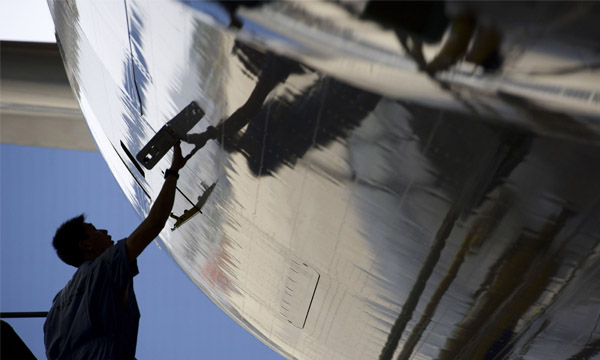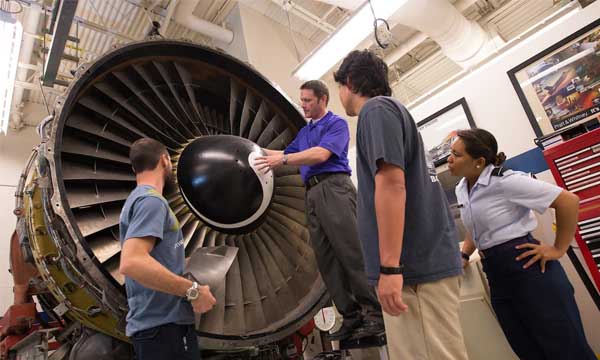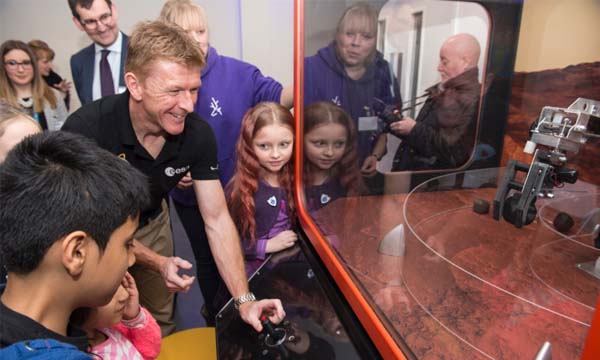Engineers, mechanics, pilots... the recruitment crisis is hitting everyone |
| Léo Barnier |
|
|
20 SEP 2018 | 1165 words
|
 |
© Boeing |
|
|
|
It's a fact that cannot be denied: a lack of pilots is starting to hit airlines and will only get worse over the next few years. The two major commercial aircraft manufacturers, Airbus and Boeing, but also regional aircraft manufacturers such as ATR, have drawn attention to the problem by mentioning the need for some 500 to 600 000 pilots over the next twenty years for commercial aviation alone. But this lack of staff isn't just limited to air crew: it is also affecting ground personnel involved in maintenance and design, technicians and engineers, to the same worrying extent.
While the demand seems to be felt the keenest in North America for now, the other regions around the world won't be spared either. A few months ago, David Longridge, Boeing Global Services (BGS) Vice President of Sales and Marketing, said that Europe would need 111 000 new maintenance technicians by 2030. For comparison's sake, BGS estimates that only 106 000 pilots would be needed.
Airbus's figures are almost identical. Last April, while he was still Head of Services by Airbus, Laurent Martinez estimated that as many pilots as mechanics would need to be trained over the next twenty years, some 500 000 people for each profession.
A brake on growth
Pour Edward Gray, General Manager and Chief of Operations at Avocet, "the whole aviation industry is affected, in every sector". This is leading to intense canvassing to recruit certain profiles, in the same way as for pilots: "Airlines are trying to recruit people who work in MRO companies as much as possible, due to the significant experience they have". This interconnected communication effect could have a serious negative impact on the smallest maintenance operators.
Edward Gray thinks that the situation is extremely worrying for the years to come: "This could certainly slow down the growth in the MRO market". Richard Brown, Aerospace and MRO Principal consultant for the ICF agency, shares his opinion : "We will have to cope with this in five to ten years. A lot of people will be retiring over the next few years and we need to guarantee the effectiveness of the pipeline by dealing with the recruitment problem now".
Demand in the maintenance sector is marked by significant generational renewal, much more visibly than for pilots. According to the BGS figures again, replacing people who retire would only account for 90% of the demand for technicians in Europe. This would only leave 10% for growth. For pilots the ratio would be 60% for attrition replacement and 40% for growth.
 A host of new initiative to develop ab initio training. © Embry Riddle Aeronautical University
A host of new initiative to develop ab initio training. © Embry Riddle Aeronautical University
Collateral damage
The problem is an especially pressing one as the aviation industry can't just implement traditional recruitment processes. During a meeting with Scott Deal, chief executive of BGS, and Johann Bordais, CEO of Embraer's Global Services & Support division in April 2018, Laurent Martinez highlighted the importance for his industry of attracting new profiles to continue to improve: "It is hard to change from the inside. We need new subsidiaries, new divisions and so new people who come from the outside and have a new way of looking at things".
This also requires the creation of new skills, particularly within the digital revolution. Here again, growth could be affected by recruitment problems. Airbus is casting the net wide to search for engineers to develop its digital tools, notably for its Skywise platform.
The impacts could even be felt indirectly. At a conference with Thales at the Farnborough Airshow last July, Pete Cooper, a researcher who specialises in cyber-security for the American think tank Atlantic Council, put his finger on the problem: "The real challenge is to find people in cyber-security who understand the industry and can make the link between the different worlds". This lack of personnel could create weak links, while guaranteeing the security of information systems is becoming absolutely vital.
Falling out of love with science and technology
According to several professionals in the sector, this recruitment problem is first and foremost due to a lack of candidates. While it's true to say that MRO is a rapidly-expanding market with long-term opportunities, the sector is having a hard time making young people want to work in it. The same is also true for production. And while in principle it appears more attractive, design isn't popular either.
Interest in STEM subjects (science, technology, engineering and maths) seems to be on the slide. For Richard Brown, the situation is clear: "Science is being abandoned today". Even in engineering colleges, where the aviation industry is strongly embedded, students seem to prefer to move into sales and finance. Some people, like Laurent Martinez, are still convinced that the younger generations will be attracted through innovation.
A host of initiatives
Several companies are trying to get things going again by promoting the sector in secondary-level education or by bringing in students to see for themselves. So, Avocet has set up the "Stand up for STEM" plan in Florida to attract young people from high school with the possibilities of apprenticeships and long-term internships in partnership with local authorities and Embry Riddle Aeronautical University. The company's investment may even extend to financing students' training.
In the same way, Airbus has increased its initiatives around the world to attract the younger generations to the aviation and space industries. In January 2017, the British astronaut Tim Peake inaugurated the Airbus Foundation Discovery Space STEM in the United Kingdom with the objective of "inspiring" 25 000 students.
Faced with the urgency of the situation, Edward Grey explains that major efforts are also being deployed with military personnel in the United States. The U.S. Federal Aviation Administration (FAA) has put major training programmes in place to convert personnel who are reaching the end of their service time into the aviation industry.
 Tim Peake is trying to give children a taste for space adventure. © Airbus
Tim Peake is trying to give children a taste for space adventure. © Airbus
Working conditions
However, the lack of interest in science or technology is not the only factor in the equation. Richard Brown identifies several other elements which are slowing down recruitment: "Aviation is an industry which experiences cyclical slow-downs, something which employees don't see as ideal. At the same time, it's an industry which pays less than elsewhere." The physical dimension in several MRO trades needs to be added, as well as difficult conditions such as working outdoors or at night.
Some people feel that this work to make the sector more popular - by developing younger generations' interest in aviation - needs to go hand in hand with an improvement in working conditions and the guarantee of long-term employment in the jobs it provides. It is only through this combination that the industry will be able again to attract and keep the profiles it is currently missing. |
|
 |
Léo Barnier
Specialized journalist
Industry & Technology, Equipments, MRO
|
|
| |
They made this section possible |
|
|
|
|
|
|
|
|
|
|
|
|
|
|
|
|
Top stories |
|
|
|
|
|
Top stories
|